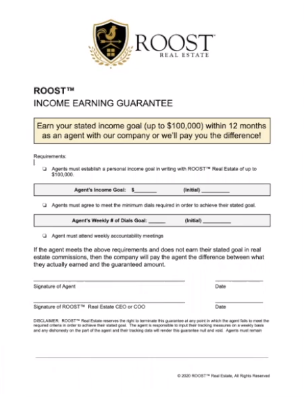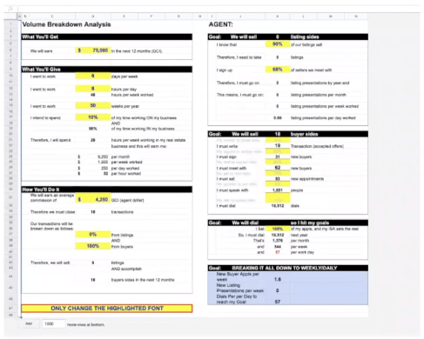We recently highlighted Part 1 of long-time CINC client John Mikesh's recent educational session with us on "The Metrics and Mindset You Need to Create Accountability". John runs an eXp team in the Charlotte area that averages $75MM in annual sales volume.
For Part 2 of his presentation, he broke down the 4 critical steps of his recruiting process.
1) Craft the Message
The best recruiting message John ever used was, “Earn your stated income goal up to $100,000 within 12 months as an agent with our company or we’ll pay you the difference!”
In case you're wondering, yes, he tried, “Earn $100,000 in your first 12 months as an agent with our company or we’ll pay the difference!” …and it didn’t work. Earning up to $100,000 was the key difference.
2) Define the Market
Who are you looking to recruit?
John strongly believes that one of the pitfalls of many agents’ recruiting models is trying to recruit anybody and everybody. What he’s found is over 90% of his team's success came from agents that were new or new to his area.
His team focuses their search on the real estate licensing schools and becomes their sponsors, which gives them the opportunity to give presentations at the school. However, what his team has found is that longer 15-30 minute presentations did not convert as high as shorter 5-minute presentations.
His team believes this is because these shorter presentations pique their interest and entice them to the point of scheduling an in-office appointment. The cost is only $100 per class for their average class size of 118, not all of whom are in his market area.
3) Present the Model
John shows them his team's real estate model and builds value on the opportunity. His team's 5-minute presentation outlines:
- NAR Industry Stats “Shocking Realities”
- The Problem
- The Solution
- Our Guarantee
- Our Agent’s “Success Stories”
- Call to Action where they can “Learn More”
His steps to recruiting new agents include:
- 5-min class presentation
- Call-to-action
- Book in-office meetings with those interested
- Review recruiting presentation, company, structure
- Schedule agent onboarding appointment
4) Develop the Materials
His team provides an income guarantee which is where the agent commits in writing to what their goal is and, based on their specific metrics, what they’ll have to do on a weekly basis at John's company to reach that goal. If the agent fulfills this guarantee, then John's team will guarantee their income or pay them the difference.

They also use an income activity calculator where they’re able to plug in the team's ratios and numbers of the number of people they dial and the percentage of people they speak to that they successfully schedule an appointment with, the percentage of people that they set an appointment with that show up to an appointment, and other relevant metrics. All of this is fleshed out and tracked through this document and these metrics hold up in anyone’s business.

They track the team's results weekly using a tool called KDNA, which tracks 7 different relevant metrics as seen below.

If an agent doesn't have a contract, then they should be at 100% of their dials.
Additionally, John's team's tracking has a built-in lie detector and exposes an agent for inputting wrong data. For example, if an agent embellishes on the number of dials they made, well what’s going to happen is if they said they made the dials but didn’t have the contacts, or even if they say they made the dials and have the contacts, then they will be exposed in only a few weeks’ time. Why weren’t they able to convert if they had both dials and contacts? What does that say about them if they’re not able to set up the appointment? It all comes back to them. Nobody wants to look bad and really it flushes people out and all the nonsense.
When you model your business in this way, John strongly believes that agents will be attracted to your company because you answer their own top-of-mind questions, which are…
Do I believe it?
Do I believe that I can do it?
When John's team shows them all the data and success stories of people that have come before them that have successfully followed this plan, they will believe it. However, will they believe they themselves can do it?
Here’s what they buy into according to John if you do it this way: they believe they can do it with his team's help. He believes his team's job is to be their coach. No player wins a championship without a coach. John strongly believes they need to instill belief in them that they can do it.

.png)


